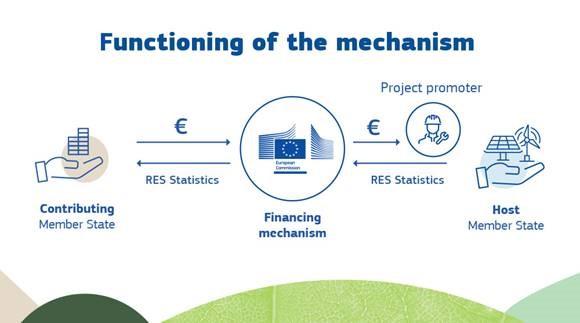Closer cooperation on renewable projects
The main objective is to enable EU countries to work more closely together in the take-up and promotion of renewables. In so doing, the countries can more easily achieve both individual and collective renewable energy targets. The mechanism will also boost renewable projects in line with the European Green Deal. The mechanism will facilitate a more cost-effective roll-out of renewables across the EU, particularly in areas that have a greater access to natural resources or are better suited for it in terms of geography.
Furthermore, in the context of the European recovery and the coronavirus pandemic, the financing mechanism will make it easier for regions to get projects off the ground at a time when their local economy is under pressure. To this end, EU countries can use the mechanism as an instrument to implement their recovery and resilience plans.
EU countries should contribute to the EU target of 32% share of renewable energy in gross final consumption by 2030, primarily through national measures. There is however, a second option, using cooperation mechanisms with others, such as statistical transfers or joint projects. The new financing mechanism opens a third possibility.
A collective approach
The renewable energy financing mechanism is based on the idea that the collective nature of the 2030 EU target for renewable energy should reflect the EU countries’ collective efforts.
Contributing and hosting countries
As outlined in the Regulation on the EU renewable energy financing mechanism (EU) 2020/1294, the mechanism links countries that voluntarily pay into the mechanism (contributing countries) with countries that agree to have new projects built on their soil (hosting countries). However, there is no direct link or negotiation between contributing and hosting countries, as is required under other EU cooperation mechanisms.
For contributing countries, the advantages are that
- they can finance renewable energy projects elsewhere that are potentially more cost effective than renewable energy produced on their own territory would be
- they can access renewable energy production that is absent or scarce on their own territory; land-locked countries can for example benefit from offshore renewable projects
The advantages for host countries are that
- they can receive additional local investment in renewable energy projects without burden to the national budget
- they can enjoy the benefits in terms of local employment, lower greenhouse gas emissions, improved air quality, modernisation of the energy system and reduced dependency on imports.
State aid rules do not apply to the mechanism, neither for contributing nor for hosting countries.
Tender and selection of projects
The financial contributions that enter the financing mechanism scheme will, through competitive tenders for grants, support new renewable energy projects in all EU countries that are willing to host such projects.
The grants cover either the installation of a renewable-production facility with certain capacity (investment support), or the actual production of renewable energy (operating support). The size of the grant is determined by the outcome of the tender procedure, where only the most competitive projects will be selected and receive support, corresponding to their bid in the tender.
The mechanism can support all technologies that are referred to as renewable energy pursuant to the Renewables Directive (EU) 2018/2001 and are applicable across the electricity, heating and cooling and transport sector.
Statistical benefits
The key element of the mechanism’s collective nature is that all countries that take part will share the statistical benefits of the produced renewable energy. It means that a contributing country can count part of the statistics from a financed project in a host country to their own national renewable energy target. The other part of the statistics remains with the host country.

Role of the private sector
The private sector have 2 possibilities to participate in the mechanism:
- as a private investor making a payment to the mechanism. This payment is not linked to a financial return, but can form part of the sustainability and decarbonisation portfolio of the company and diversifies its investment agenda. Such financial contributions will count to the EU binding target of at least 32 % of renewable energy. In addition, subject to the hosting EU country's rules, private contributors can request the guarantees of origins for the energy production that corresponds to their contribution.
- as a project developer competing for support in the tender that will be published by the Commission. The successful participants will conclude a grant award agreement and will turn the financial support into new renewable projects across the EU which will contribute to the national targets for renewables in both contributing and hosting countries.
Documents
- Regulation on the EU renewable energy financing mechanism (EU) 2020/1294 2020
- Factsheet – EU renewable energy financing mechanism (EN | FR | DE, September 2020)
- Governance of the Energy Union and Climate Action (EU) Regulation 2018/1999

